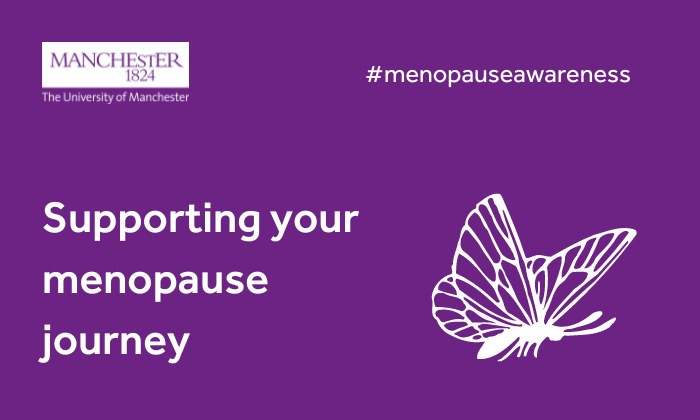World Menopause Day
18 Oct 2023
Sign up for Creative Writing Workshops

Today marks World Menopause Day which is part of Menopause Awareness Month. The theme for World Menopause Day this year is the impact of the menopause on cardiovascular health. To read more on this, please read our menopause article released earlier this month.
The Menopause can impact all individuals: Banji Adewumi, Director of Equality, Diversity & Inclusion, explains:
‘The University recognises that anyone can be impacted by the effects of the menopause whether as a woman, members of the trans and non-binary community or as a partner and everyone's experience is different. As part of our EDI Strategic priority actions for an inclusive environment and culture, promoting wellbeing is one of our key actions and as such, our EDI Directorate fully supports Menopause Month and is actively working with the wellbeing team and the Menopause Support Group to support our staff and students.’
Transgender and Menopause
Members of the trans and non-binary community can sometimes experience menopause symptoms if they are taking hormonal treatments. Those taking hormones to feminise will usually take oestrogen and progesterone, along with testosterone blockers. To masculinise, they will take testosterone and oestrogen blockers. People taking these hormones have regular health checks.
Menopause symptoms can arise when they need to come off hormones, which they may have to do for procedures. They may experience the same symptoms when they restart the hormones.
Further information can be found at HenPicked
Other helpful links include:
Perimenopause
Included in the Menopause conversation is Perimenopause: Perimenopause means "around menopause" and refers to the time during which your body makes the natural transition to menopause, marking the end of the reproductive years.
People start perimenopause at different ages. You may notice signs of progression toward menopause, such as menstrual irregularity, sometime in your 40s. But some people notice changes earlier in their 30’s.
Symptoms of perimenopause can be physical, or psychological, or both. It can be the psychological ones that people say can really sneak up on them and catch them unawares. In many cases, individuals don’t know these symptoms are caused by perimenopause.
Physical symptoms can include:
• Hot flushes, experienced during the day or night (night sweats)
• Changes to your periods, increased or decreased flow, increase or decrease in frequency
• Insomnia or fatigue
• Headaches or migraines
• Vaginal dryness
• Urinary tract infections (UTIs)
• Aching joints
• Itching
Psychological symptoms include:
• Increased anxiety or worry
• Lack of confidence and self esteem
• Low or changing moods
• Problems with memory recall
• Heightened emotions
• Decreased sex drive
Support for the perimenopause
There are many things you can consider to help manage symptoms of Perimenopause: nutrition and exercise schemes, natural remedies, counselling support or a medical approach such as Hormone Replacement Treatment (HRT). The key point to remember is If your symptoms are getting in the way of you enjoying your life or your work, reach out to support such as your GP to discuss further.
Events
There are still spaces available on the Creative Writing in Menopause Workshops, details and registration below:
The first session will be aimed at supporting you in getting started with a creative writing for wellbeing practice; whilst the second will be an exploration of poetry.
Both sessions are 12.30pm until 2pm, in-person, location to be confirmed:
